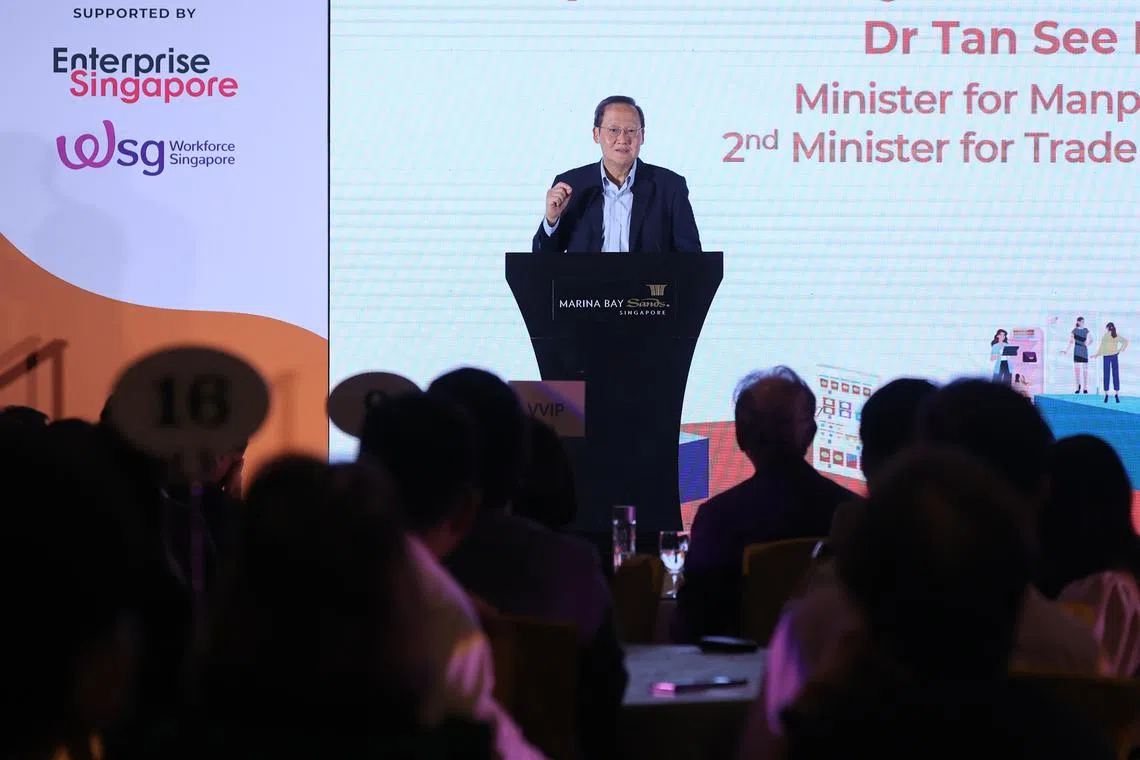Jobs-Skills Integrator appointed to help retailers train new and existing workers
Sign up now: Get ST's newsletters delivered to your inbox

The Jobs-Skills Integrator for Retail will help close gaps in job redesign and aggregation of skills needs within the industry.
ST PHOTO: KUA CHEE SIONG
Follow topic:
SINGAPORE – New retail channels such as live streams that blend entertainment and sales promotion, as well as group buys on chat groups, are among the trends shaking up Singapore’s retail industry in recent years.
This is why retailers that do not adopt digital technologies, efficiently provide more personalised service, or help staff improve their productivity could be left behind.
Help will now be available for retailers that wish to transform their business and workforce to keep up, through the Singapore National Employers Federation (SNEF), which has been appointed as the Jobs-Skills Integrator for Retail (JSIT-R) from Thursday.
“The JSIT-R will function as a one-stop advisory service, or ‘customer service centre’, for retailers who are keen to embark on their transformation journey,” said Manpower Minister Tan See Leng, who is also Second Minister for Trade and Industry.
Announced by Deputy Prime Minister Lawrence Wong during the Budget statement
This includes identifying high-quality courses relevant to an industry’s emerging needs, as well as helping businesses and employees apply for support schemes and funding that they qualify for.
SNEF will partner the National Trades Union Congress and refer to the Jobs Transformation Map (JTM) for the retail sector in its work as JSIT-R.
Dr Tan unveiled both the JTM and SNEF’s appointment as JSIT-R at a launch event held at Marina Bay Sands Expo and Convention Centre on Thursday.
JTM sets out the evolving roles that are likely to require job redesign, and the skills needed for the redesigned roles, as well as emerging roles and skills the retail sector is set to require.
It identified 14 roles that are likely to undergo a medium or high degree of change, such as sales associates and store managers, and nine emerging roles, such as sustainability specialists.
“JTM provides detailed insights on the key technologies and trends that are driving change in the retail industry, and what the potential positive impact it will have on job roles,” said Dr Tan, adding that critical skill sets and skill levels for each role are clearly identified in the road map.
He said the JTM will also guide small retailers on how they might merge some roles to manage a manpower shortage.

Manpower Minister Tan See Leng said the Jobs-Skills Integrator for Retail will function as a one-stop advisory service, or “customer service centre”, for retailers who are keen to embark on their transformation journey.
PHOTO: LIANHE ZAOBAO
Spearheaded by Enterprise Singapore (EnterpriseSG) and Workforce Singapore (WSG), with the support of the Ministry of Manpower and SkillsFuture Singapore, this JTM builds on the Retail Industry Transformation Map 2025 launched in October 2022.
EnterpriseSG and WSG said in a joint statement that the JSIT-R will help close gaps in job redesign and aggregation of skills needs within the retail industry through a three-pronged approach.
The first involves advising retailers on how to reskill existing workers for redesigned jobs based on the JTM, informing retailers on the grants and support schemes available to them, and helping them apply for these.
JSIT-R will also, as a second prong, identify skill gaps in the industry, so it can work with training providers and institutes of higher learning to curate relevant training courses, or even develop new courses.
As a third prong, the integrator will raise awareness of emerging and enhanced job roles among employees and job seekers, as well as help match job seekers keen to enter the sector with job and industry placements.
The retail sector contributes $7.3 billion to Singapore’s economy.
It employs more than 160,000 workers, making up around 4.2 per cent of the country’s workforce in 2022.
At the launch event, three retail industry bodies – the Singapore Retailers Association (SRA), Singapore Furniture Industries Council and Singapore Fashion Council – inked a memorandum of understanding with SNEF and NTUC.
Representing over 1,100 member companies that employ almost 94,000 workers in total, the three bodies committed to reach out and work with both member companies and other retailers to drive job transformation through the JTM and JSIT-R.
SRA executive director Rose Tong said many members of the association face challenges in taking the first step in job redesign, which she hoped the JSIT-R and JTM would combine to address.
“They don’t know how to start, where to start, and some of them may not be aware of the incentives and grants,” she said.
One employee who has benefited from job redesign is Mr Louis Ong, 42, a senior district operations manager at Wing Tai Holdings’ retail, apparel and lifestyle division.
Previously, his job involved overseeing store performance, customer service, staff management and inventory at six of the 17 G2000 clothing stores in Singapore.
With the aid of WSG’s Support for Job Redesign under the Productivity Solutions Grant, Wing Tai Holdings redesigned Mr Ong’s role in 2022 to take on new responsibilities in forecasting sales and planning sales strategies, among others.
Contrasting between the Hong Kong and Singapore markets for G2000 as an example, he said: “The buying pattern might be different because for our local market... we are more (focused on) basics, unlike in Hong Kong, where they are more fashion-forward, so certain prints or colours might not cater to Singapore’s needs.”

